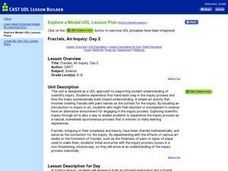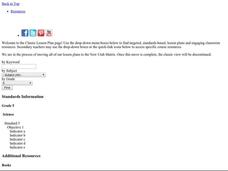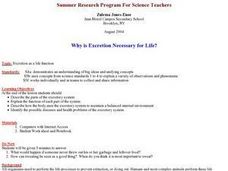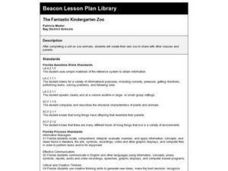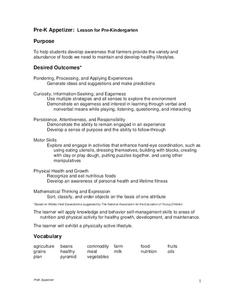Curated OER
Countdown Calendar
Students create a calendar of endangered species. In this preservation lesson, students research endangered species of plants and animals around the Lake Pontchartrain Basin. Students gather facts about the endangered species and create...
Curated OER
World Geography: Climate Change Round Table
Learners are able to explain the suspected causes of relatively recent climate changes, specifically the observed global warming. They discuss how unusual or extreme global warming disrupts the balance of the earth's geo-spheres.
Curated OER
How Germs Spread
Students conduct a test to help them visualize the spread of
germs. They identify that a pandemic is an epidemic (an outbreak of an infectious disease) that spreads across a large region or even worldwide. Finally, students state...
Alabama Learning Exchange
I'm so Crushed
As an experiment is demonstrated for them, learners write down their observations and brainstorm questions that can help them understand what they saw. After watching the experiment again—which demonstrates a soda can collapsing due to...
Curated OER
Habits of Mind
Students study tree leaves to complete the activity, For this tree leaf experiment lesson, students observe, measure, and sort tree leaves individually, in groups, and in relationship to the entire tree.
Curated OER
A Tree is an Ecosystem
Students make observations about trees. In this ecosystem lesson plan, students observe and record all living and non living things they find under a tree, look for birds nests, evidence of woodpeckers and take samples such as leafs,...
Curated OER
Electricity and Lightning
Students define important vocabulary words related to electricity and charges. In this physics instructional activity, students examine force created by electricity and lightning. They differentiate between the two forces and how they...
Curated OER
Flowers, Pods, and Seeds
Students gain an understanding of living organisms. the complete a plant growth data log to chart plant growth and to make observations, predictions, and personal reflections.
Curated OER
Understanding the Effects of Water Pollution
Third graders examine the effects of water pollution by participating in a story. After reading the story, they determine the best way to get rid of the pollution in a river using different objects. In groups, they complete a worksheet...
Curated OER
Fractals, An Inquiry
Students observe and discuss several different fractal drawings and relate them to patterns they see in nature. They use an online fractal tool to create and modify a fractal image and then create their own fractal image with paint.
Curated OER
Sustainable Choices
High schoolers examine energy use and the different construction materials used in their home. In this sustainable choices lesson students study different materials and what a sound environmental choice would be.
Curated OER
Peanut Butter Broccoli
Fifth graders explore food production by viewing DNA presentations. In this genetic engineering lesson, 5th graders discuss the foods they typically eat at home and how many common foods are engineered in a way that can produce a bigger...
Curated OER
Rock, Paper, Scissors
Fifth graders explore genetic traits. In this genetic traits lesson, 5th graders investigate dominant and recessive traits. Students identify similar traits between a parent organism and its offspring.
Curated OER
The Right Chemistry
Students see that chemistry is the study of matter, how matter reacts and combines to create new chemicals, the changes that take place in matter and what makes up matter. This lesson provides many good ideas across the curriculum to...
Curated OER
Classification 2: A Touch of Class
Students examine how many kinds of living things (e.g. plants and animals) can be sorted into groups in many ways using various features to decide which things belong to which group and that classification schemes vary with purpose.
Curated OER
Observing Complete Metamorphosis
Sixth graders read about metamorphosis. They observe the metamorphosis of mealworms and set up the tables using Word processing to record their observations as the mealworms went through the stages of metamorphosis.
Curated OER
Why is Excretion Necessary for Life?
Learners describe and explain the function of each part of the excretory system. They discuss how the body uses the excretory system and identify diseases of the system.
Curated OER
Exploring Deep Ocean Habitats: Alien Invasion
Students compare and contrast "alien species" and "invasive species."Students explain positive and negative impacts associated with introduction of non-native species, and give a specific example of species that produce t
Curated OER
Maple Syrup Production
Students examine the steps of maple sugar production and the labor and effort involved from the tree to the final product. They participate in a taste test game, and if they have access to maple trees, make their own syrup and sugar.
Curated OER
Parts of a Cell
Students explore the parts of a cell. They identify the structures of plant and animal cells. Students explain the functions of plant and animal cells. They compare and contrast animal cells to plant cells. Students create a model of the...
Curated OER
The Fantastic Kindergarten Zoo
First graders create their own zoo to share with other classes and parents. Groups create displays for the animals. Have each group brainstorm how they create a display for their animal.
Curated OER
Soil In The Amazon
Students grow plants in soil representing that found in the Amazon basin. They compare results to plants growing in fertile soil and soil fertilized with leaf compost. Students chart, average and graph plant growth by height.
Students...
Curated OER
Genetics 4 Mutations
Students identify and illustrate how changes in DNA cause mutations and evaluate the significance of these changes. They illustrate a chromosomal mutation such as duplication, deletion, inversion, and translocation.
Curated OER
Pre-K Appetizer
Students understand there are healthy and not healthy food choices. In this food pyramid lesson, students learn to make healthy choices by playing a traffic light game. Students recognize raw foods from the farm may not be ready for...









